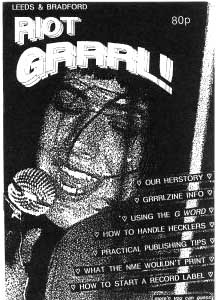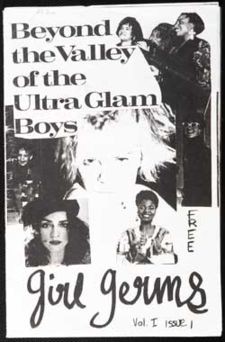| Riot Grrrl | |
|---|---|
| Stylistic origins: | Hardcore punk, Punk rock, Indie rock, Third-wave feminism, Queercore, Straight edge, Queer theory, All-women bands |
| Cultural origins: | early 1990s, Seattle, Olympia, Washington DC United States |
| Typical instruments: | Guitar - Bass - Drums |
| Mainstream popularity: | early 1990s, primarily underground |
| Regional scenes | |
| Washington State Washington, D.C. | |
| Other topics | |
| Grunge | |

Riot Grrrl (or Riot Grrl) is a feminist musical and political movement beginning in the early 1990s. Riot Grrrl can also refer to the genre of music produced by that movement. Many perceive the movement as a response to sexist attitudes within punk rock culture and the world at large. Riot Grrrl is characterized by the creation of a woman-friendly subculture within punk rock that embraced the formation of female punk rock bands, self-publication via zines, female-centric music festivals, meetings, and the DIY ethic. The movement is largely associated with the Washington D.C. and Olympia, Washington areas. Riot Grrrl arose after the Queercore movement, although the distinction between the two movements is at times blurred, given bands such as Team Dresch who embraced both genres.
Contents |
Feminism and Riot Grrrl
Riot Grrrl can be seen as one embodiment of third wave feminism. Riot Grrrl lyrics often address issues such as rape, domestic abuse, sexuality and female empowerment. As summarized by The Guardian in its April 15, 1995 supplement:
When the Riot Grrrl movement began in America in 1991, its intention was to redress the balance of power via the punk rock underground using slogans (words like ‘rape’ and ‘slut’ written in black marker pens on exposed stomachs or bare arms), fanzines, meetings and women-only shows.
Riot Grrrl bands
The groups Bikini Kill and Bratmobile are considered two of the prime instigators of Riot Grrrl. With the rallying cry of "revolution girl style now," they and other bands such Heavens to Betsy, Sleater-Kinney, Cheesecake, Excuse 17, Huggy Bear, Team Dresch, Tattle Tale, and others, helped form the Riot Grrrl movement.
Riot Grrrl musicians largely shunned the major record labels, signing instead with indie labels such as Kill Rock Stars, K Records, and Chainsaw Records.
History
 Riot Grrrl zine Girl Germs Issue 1
Riot Grrrl zine Girl Germs Issue 1
Like its contemporary, grunge music, Riot Grrrl arose in the fertile music scene of Seattle and Olympia as well as in Washington D.C, although it was not limited to these cities. Other scenes arose across the United States, and in the United Kingdom, represented by such groups as Huggy Bear and Voodoo Queens.
Uses and meanings of the term Riot Grrrl developed slowly over time, but its origins can be traced to racially charged riots in Washington D.C.'s Mount Pleasant neighborhood during the spring of 1991. Writing in Dance of Days: Two Decades of Punk in the Nation's Capital, Mark Andersen reports early Bratmobile member Jen Smith (later of The Quails) reacting to the riots by writing, "This summer's going to be a girl riot." Soon afterwards, Tobi Vail collaborated with Kathleen Hannah to create a new zine and called it Riot Grrrl.
Breaking out from the music, Riot Grrrl activities included national conventions in D.C., the Pussystock festival in New York City, and a slew of zines, notably Girl Germs, Jigsaw, Fantastic Fanzine, Satan Wears A Bra and Quit Whining. Riot Grrrl's momentum was supported by an explosion of self-published zines that covered a variety of feminist topics, frequently attempting to draw out the political implications of intensely personal experiences with sexism, mental illness, body image, sexual abuse, and homosexuality. These zines were archived for many years by Riot Grrrl Press, started in Washington DC in 1992 by Erika Reinstein & May Summer. Due to financial hardships, Riot Grrrl Press disbanded in the late '90s.
Much to their chagrin, Riot Grrrls found themselves in the media spotlight during 1992, featured for dragging feminism into the mosh pit in magazines from Seventeen to Newsweek. This increased press coverage led to conflict within the Riot Grrrl community as many felt that Riot Grrrl was being appropriated by the media against the movement's will and its radical message marginalized. Fallout from the media coverage led to resignations of people like Jessica Hopper, who was at the center of the Newsweek article. Lead singer Kathleen Hanna of Bikini Kill called that year for "a press block".
In an essay from January 1994, included in the CD version of Bikini Kill's first two records, Tobi Vail responded to media simplifications and mis-characterization of Riot Grrrl:
"one huge misconception for instance that has been repeated over and over again in magazines we have never spoken to and also by those who believe these sources without checking things out themselves is that Bikini Kill is the definitive 'riot girl band' ... We are not in anyway 'leaders of' or authorities on the 'Riot Girl' movement. In fact, as individuals we have each had different experiences with, feelings on, opinions of and varying degrees of involvement with 'Riot Girl' and though we totally respect those who still feel that label is important and meaningful to them, we have never used that term to describe ourselves AS A BAND. As individuals we respect and utilize and subscribe to a variety of different aesthetics, strategies, and beliefs, both political and punk-wise, some of which are probably considered 'riot girl.'"
Legacy
By the mid-nineties, Riot Grrrl had severely splintered. Many within the movement felt that the mainstream media had completely marginalized their message, and that the politically radical aspects of Riot Grrrl had been appropriated by the likes of the Spice Girls and their encouraging but non-political "girl power" message.
However, the influence of Riot Grrrl can still be felt in many aspects of indie and punk rock culture. Kaia Wilson of Team Dresch and multimedia artist Tammy Rae Carland went on to form the now-defunct Mr. Lady Records which released albums by The Butchies and Le Tigre. Many of the women involved in Riot Grrrl are still active in creating politically-charged music. Notably, Kathleen Hanna of Bikini Kill went on to found the influential electronic feminist group Le Tigre. Corin Tucker of Heavens to Betsy and Carrie Brownstein of Excuse 17 co-founded Sleater-Kinney at the tail end of Riot Grrrl and in 2005 left Olympia-based Kill Rock Stars to release The Woods on Sub Pop records. Kathi Wilcox joined the Casual Dots, and Bratmobile reunited in 2000 to release two albums. In addition, girl-positive independent music festivals such as Ladyfest continue to thrive.
See also
External links
- Riotgrrl.co.uk
- Riot Grrrl Online
- Riot Grrrl Retrospective at the Experience Music Project
- Grrrl Zine Network
- Ladyfest
- LadyWiki
- Riot Grrrl Online Message Board/Forum
- German speaking Riot Grrrl Forum
- Riot Grrrl FrenchSite
- \\Quitéria\\
| Punk rock |
|---|
| Anarcho-punk - Anti-folk - Crust punk - Garage punk - Hardcore - Post-hardcore - Horror punk - New Wave - No Wave - Noise rock - Oi! - Pop punk - Post-punk - Psychobilly - Deathcountry - Riot grrrl - Ska punk - Streetpunk - Two Tone |
| Other topics |
| Protopunk |
| Alternative rock |
| Alternative metal - Britpop - C86 - College rock - Dream pop - Gothic rock - Grebo - Grunge - Indie pop/Indie rock - Industrial rock - Lo-fi - Madchester - Math rock - Noise pop - Paisley Underground - Post-punk revival - Post-rock - Riot Grrrl - Sadcore - Shoegazing - Space rock - Twee pop |
| Other topics |
| History - Indie (music) |
Categories: Punk




 216.73.216.133
216.73.216.133 User Stats:
User Stats:
 Today: 0
Today: 0 Yesterday: 0
Yesterday: 0 This Month: 0
This Month: 0 This Year: 0
This Year: 0 Total Users: 117
Total Users: 117 New Members:
New Members:
 216.73.xxx.xxx
216.73.xxx.xxx
 Server Time:
Server Time: